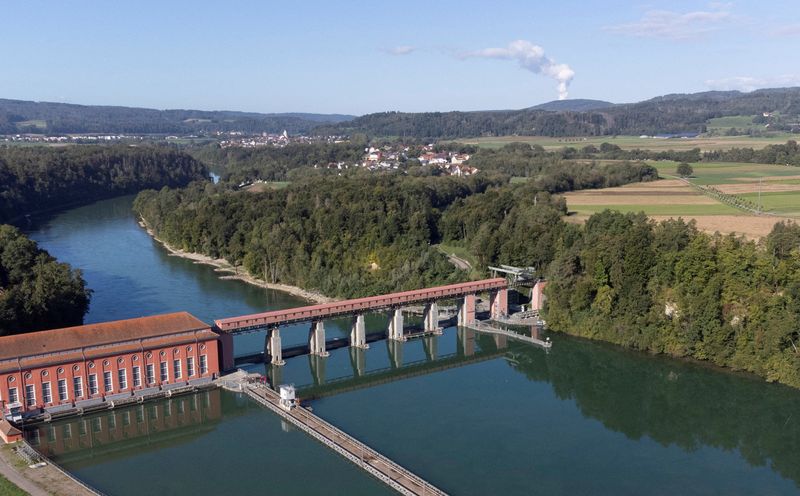By Emma Farge and Dave Graham
GENEVA/ZURICH (Reuters) - Bringing new nuclear power stations online in Switzerland could take decades due to myriad political and financial hurdles, energy experts and politicians said, after the government announced plans to lift a ban on building new plants.
The Federal Council on Wednesday reversed a 2017 decision to exit nuclear power, in order to meet climate goals and respond to geopolitical uncertainties such as the Ukraine war, which has fed fears of outages in the country.
Nuclear energy advocates welcomed the move, with Le Temps newspaper calling it "good news" in view of global changes since the 2011 Fukushima nuclear accident in Japan, which had prompted Switzerland's exit plan.
But few expect change to come easily - or quickly.
Stephanie Eger, nuclear energy expert at the Swiss Energy Foundation (SES), said the process of changing the law, finding billions of dollars in financing, obtaining the permits - while seeing off likely referenda by opponents - and building a plant, would probably take at least 35 years.
Subsidies would also very likely be necessary and so nuclear advocates would require "a lot of stamina and deep pockets" to see it through, Eger said, arguing there were cheaper and more sustainable alternatives.
Currently, nearly a third of Swiss electricity production comes from nuclear power while hydropower accounts for about 62%, Swiss government figures show. Fossil fuels and renewable energy excluding hydropower account for only 9% of the country's energy.
Andreas Pautz, head of the Center for Nuclear Engineering and Sciences at the Paul Scherrer Institut, a research centre, said the years needed to lift the ban on new nuclear plants and get licenses approved would mean any construction would unlikely begin before 2040.
If that occurred, with supply chain improvements and streamlined regulations, commercial operations could begin by the middle of the 2040s, Pautz said.
Roger Nordmann, a federal lawmaker opposed to the U-turn, was more sceptical, seeing it taking until the early 2060s.
"It's a very long process and it's going to be very hard," he said, foreseeing referendums on three future bills needed to authorize a new plant under Switzerland's direct democracy.
Switzerland has decommissioned one plant and the remaining three are ageing, built between the late 1960s and early 1980s.
Energy ministry spokesperson Marianne Zünd said it was too early to give an estimated date for new projects.
But current plants could keep running until at least their 60th year, provided they met safety requirements, she said.
Even if the government overcomes parliamentary opposition, pockets of local resistance can threaten progress.

Switzerland's first planned reactor had a core melt in 1969, stoking safety fears that still linger. Another challenge is the cost, with neighbours like France going billions of dollars over budget on nuclear projects.
"It's coming too late," said Greenpeace's Nathan Solothurnmann. "And it's a distraction because we need to focus on renewables now."